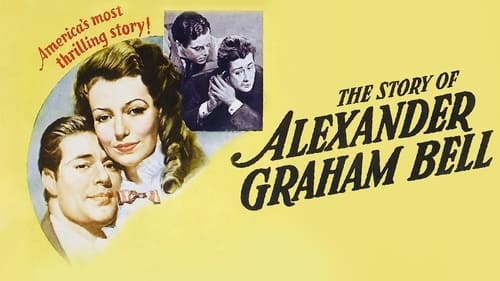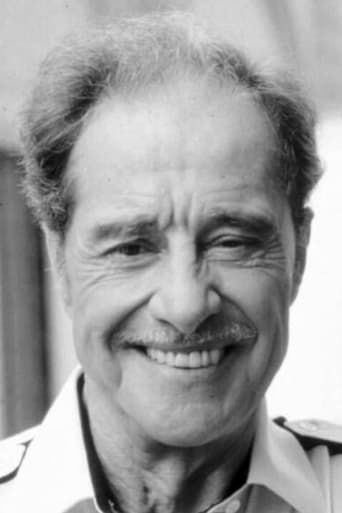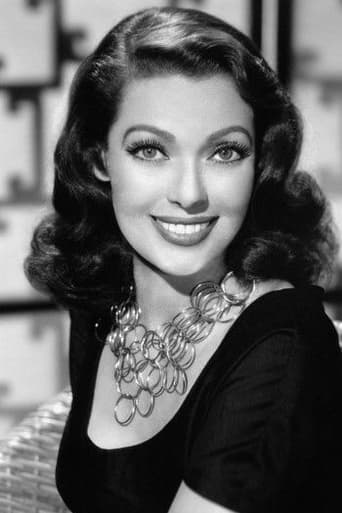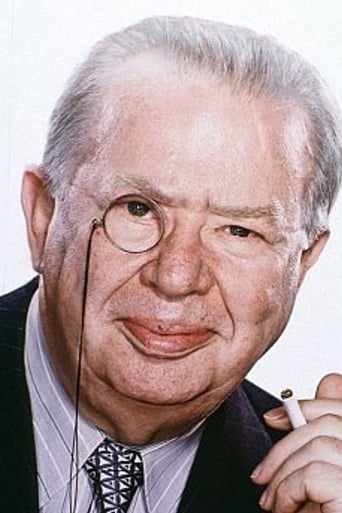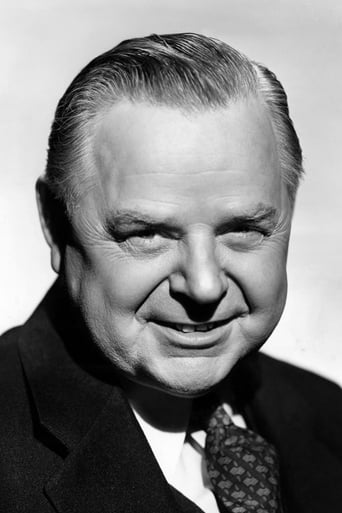GamerTab
That was an excellent one.
Invaderbank
The film creates a perfect balance between action and depth of basic needs, in the midst of an infertile atmosphere.
Brendon Jones
It’s fine. It's literally the definition of a fine movie. You’ve seen it before, you know every beat and outcome before the characters even do. Only question is how much escapism you’re looking for.
Geraldine
The story, direction, characters, and writing/dialogue is akin to taking a tranquilizer shot to the neck, but everything else was so well done.
thinker1691
Irving Cummings does an excellent job directing the cast of assembled actors in this film. The story itself is taken from the memories of the daughter of Alex Bell and follows through with all the trials and tribulations of Bell himself. Beginning with the decision he gave up teaching the deaf and dumb to speak and through the obscure and menial existence of an inventor, up through the difficult task fighting for his invention in court. Don Ameche plays Alexander Graham Bell, who does so with such spirit and vitality, audiences will later realize why this actor is so synonymous with the character. The same is true with Henry Fonda who plays Thomas Watson who also is easily identified with this movie. Loretta Young, Charles Coburn and Gene Lockhart are magnificent and help insure this black and white becomes a solid standard in any collection of what we now understand as Classic films. ****
HobbitHole
Alexander Graham Bell came from a family of elocutionists. His grandfather and father were both published on the subject. He trained also to become a teacher, but having a deaf mother, he came to desire more than just teaching.In his early stages of teaching, he begins by teaching a young mute boy (Bobs Watson) while being paid by the father of the boy (Gene Lockhart). The money he earns from this, he uses to work on first the telegraph, then the telephone.The mute boy's father is so pleased with the way his son can communicate using a special alphabet glove,that he introduces Bell to his friend (Charles Coburn) who has 4 daughters, including a daughter who became death after having scarlet fever when she was younger. The father kept speaking of his 'little girl'. Imagine Bells surprise when it turned out to be a grown woman (Loretta Young) who, along with her three sisters, play the roles of the business man's daughters.Mabel (Young) 'fell' for him at first sight as she accidentally runs into him when he is coming to their house, not realizing he is the man her father invited to help her. Thinking this business man is going to be able to help him finance the telegraph, he begins to tell him of his invention until the father says he wants Bell to help his daughter. They can talk of the invention another time.The two fall in love, with Young playing a woman who not only backs Alec's (Bell/Ameche) grand ideas and inventions, but encourages him not to give up hope and occasionally puts her foot down when it comes to him not giving up the idea of inventing the telephone and when Bell later is attacked by a firm who claim he stole their invention and sued Bell.Bell got this news right when it seemed things were going the best for him. Queen Victoria had agreed to wire the castle with the telephone and what the queen did was often imitated throughout the world! Plus Bell finds out he is to be a father. But he also gets a letter from his father in law that a company is suing him for copyright stealing.He determines to return to the States, fight the lawsuit with truth to defend not only his invention, but his father-in-law, his friend, the mute boy's father (both of whom backed him to the hilt on the telephone), his partner in experiments Watson(Henry Fonda) and for all inventors who are poor and have their ideas copyrighted, only to be stolen by those with less scruples and more money.When she hears how badly the trial is going due to lack of evidence, Bell's wife and mother come to the trial. It seems that for lack of available paper, Bell had written a love letter to his dear Mabel on the back of an important bit of evidence that could be the key to him winning the lawsuit and keep he and his partners from being robbed of his invention and going bankrupt.Interestingly, both Lockhart and Coburn also are important players in the story 'Edison, the Man' but with Coburn being the more sympathetic and Lockhart the heavy. In this one Lockhart is usually more sympathetic and Coburn usually more cynical. Both have added beards and mustaches that change the appearance to a degree. This film, I believe, was released first.Yes, it is likely that Hollywood may have embellished the biography a bit and why not? It is an inspiring film that shows that there is much hunger, pain and even delays in being married when someone follows their dream to invent. But it also is often well worth it if the inventor sticks with it. Of course it's no guarantee all stories will turn out as well as this one and, ironically, in "Edison, the Man", Edison also has to defend his invention of electricity in court.Not sure if anyone else caught it, but I think they did make one goof in the film. Towards the end, the mother of Bell's wife (Spring Byington) knocks on the door of the room Bell and his wife are in. I believe Bell may ask who it is, but when the mother says it's mom, Bell's wife (deaf) says 'come in Mom'. Either a clever guess on her part, or an error revealing that she can really hear. Nothing had been said (that I could see...)to show if he was somehow able to help her hear or to give her a clue as to who it was at the door.To the commenter that was deaf and asked about Young's character Mabel being born deaf or becoming it: the father says it was from scarlet fever as a young girl and she was sent to England (I believe) to study how to read lips.Considering that it was 1875-6 that the story was set in and that the film was release only about 10 years into 'talkies', I thought it was quite a good performance on Young's part.An enjoyable movie. Even one that older kids can watch and learn about how what is now so taken for granted (not only telephones that can call across countries and around the world, but mobile phones, phones that can send photos and video as well as voice, etc.), but something that would have been quite impossible without someone to invent it.I hope the incentive to invent things that are beneficial to humanity is never taken away and maybe films like this one will help encourage people to keep trying and to aim for something that will benefit many people as Alexander Graham Bell did.
Neil Doyle
Just how factual all the events are in Fox's biographical account of THE STORY OF Alexander GRAHAM BELL, I don't know, but it seems safe to say they have taken the basic outline of his life and embellished it with a series of vignettes that serve to show us how and why he became the inventor of the telephone.Although this is DON AMECHE's signature role (indeed the invention is often referred to as "The Ameche"), he clearly had better roles in his future. Here he overacts to a tiresome degree under Irving Cummings' direction. On the other hand, there's a considerable amount of underplaying by LORETTA YOUNG and HENRY FONDA in subordinate roles. Young is Ameche's deaf wife and Fonda is his laboratory assistant.Factual or not, it moves at a slow pace and may not be the kind of biography for everyone, lacking the vigorous style of a story about Jesse James, for example. There's a little too much talk before we get to the crucial scene in the film where Ameche spills acid and calls for help over the wire to Fonda in the next room.Supporting cast includes GENE LOCKHART, SPRING BYINGTON and CHARLES COBURN (who must have been one of Hollywood's busiest character actors in the '30s and '40s).
jotix100
This biopic about the invention of the telephone proved to be a surprise. Not having seen it, we took the chance and it proved to be a real charmer. Under the direction of Irving Cummings, we get to know a great deal, not only about the invention itself, but a little bit about the man.Alexander Graham Bell was an ambitious man who was interested in helping a young deaf-mute boy, as the picture opens. We see him toiling at a prototype for the telegraph, and stumbling into the transmission of sound through wires, thus creating something that revolutionized society, business and the world at large. In retrospect, one can only imagine how could anyone survived without it! Thanks to Mr. Bell, his invention is something that benefited all of us.Don Ameche makes an intense Alexander Graham Bell. He was a charming actor who never ceased to amaze us in all the movies he left behind. Loretta Young, makes a wonderful Mabel Hubbard, Mr. Bell's beloved wife who had to struggle with her own deafness. A young Henry Fonda is seen as Bell's loyal friend Thomas Watson.The cast assembled for the film shows the best Hollywood could offer. Charles Coburn and Spring Byinton play the kind Hubbards. Gene Lockhart is also quite good as Thomas Sanders. Two of Loretta Young sisters Polly Ann and Georgiana play two of the Hubbard girls, as well as Sally Blane who is the fourth daughter.This is a film that is instructive as well as fun to watch because of the subject matter and the cast that made the story come alive.

